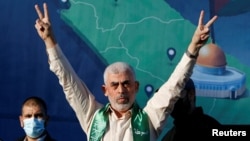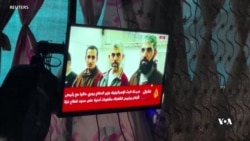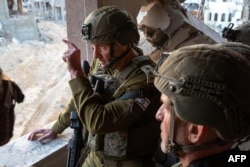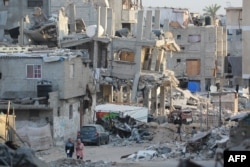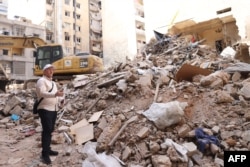Israel announced Thursday it killed Hamas leader Yahya Sinwar, the architect of the militants' October 7, 2023, terror attack that sparked the Gaza war.
Israeli forces — apparently by chance and without knowledge of Sinwar's location — encountered him and two other militants in a southern Gaza building and opened fire. Israel almost immediately suspected it had killed the 61-year-old Sinwar but only confirmed it after hours of investigation, including checking his DNA and dental records.
"Mass murderer Yahya Sinwar, who was responsible for the massacre and atrocities of October 7, was killed today by IDF soldiers," Israeli Foreign Minister Israel Katz said in a statement.
Katz called Sinwar's killing a "military and moral achievement for the Israeli army."
"The assassination of Sinwar will create the possibility to immediately release the hostages and to bring a change that will lead to a new reality in Gaza — without Hamas and without Iranian control," he said.
But the immediate impact of Sinwar's death was uncertain. Talks for a cease-fire in the Gaza fighting have been stalemated for months, with both Hamas and Israel balking at the details in any halt to the conflict.
Israeli Prime Minister Benjamin Netanyahu, in a recorded video statement in Hebrew following Sinwar's death, told Gaza residents, "He ruined your lives," saying it was their chance to get rid of his tyranny.
"Today, evil took a heavy blow — the mission ahead of us is still unfinished," Netanyahu said. He characterized Sinwar's death as "an important milestone in the sunset of Hamas' rule in Gaza."
U.S. President Joe Biden said in a statement, "This is a good day for Israel, for the United States, and for the world."
He added, "There is now the opportunity for a 'day after' in Gaza without Hamas in power, and for a political settlement that provides a better future for Israelis and Palestinians alike. Yahya Sinwar was an insurmountable obstacle to achieving all of those goals. That obstacle no longer exists. But much work remains before us."
Hamas, a U.S.-designated terror group, is believed to still be holding about 100 of the 250 hostages the militants captured in the attack last October, although more than 30 are believed to be dead.
Israel said there were no signs that hostages had been present in the building where Sinwar and the other two militants were killed.
Sinwar was named leader of Hamas following the August assassination of former leader Ismail Haniyeh in Tehran. Iran blamed Israel for the killing of Haniyeh, who had gone to Tehran to attend the inauguration of Iran's new president.
In a statement, Michael Herzog, the Israeli ambassador to the United States, said, "Today, the world is a safer place. Yahya Sinwar, the sadistic mastermind behind the heinous Hamas terror attack of October 7, has finally faced justice."
Herzog compared him to other terrorists, saying, "Like the elimination of Osama Bin Laden and Abu Bakr al-Baghdadi, taking out Hassan Nasrallah and Yahya Sinwar opens up significant opportunities for a better and more secure region."
Money, identification documents and combat equipment were found on the bodies of the militants. Israeli media reported that the forces that encountered the terrorists were not in the area for an assassination operation and did not have prior intelligence on Sinwar's presence there.
In northern Gaza
Elsewhere on the battlefront, health officials in northern Gaza said Thursday an Israeli airstrike on a school-turned-shelter for displaced Palestinians killed at least 14 people, including five children.
The Israeli military said it was targeting dozens of Hamas and Islamic Jihad militants who had gathered at the school in Jabaliya, where Israeli forces had been carrying out a major air and ground offensive for more than a week.
The Israeli military provided a list of about a dozen names of people it identified as militants at the site, but the names could not be immediately verified.
Fares Abu Hamza, head of the Health Ministry's emergency unit in northern Gaza, confirmed the death toll and said dozens of people were wounded. He said the nearby Kamal Adwan Hospital was struggling to treat the casualties.
"Many women and children are in critical condition," he said.
Israel has repeatedly struck tent camps and schools sheltering displaced people in Gaza. The Israeli military says it carries out precise strikes on militants and tries to avoid harming civilians, but its strikes often kill women and children.
Hamas-led militants triggered the war when they stormed into southern Israel on October 7 a year ago, killing about 1,200 people, mostly civilians.
Israel's retaliatory offensive has killed more than 42,000 Palestinians, according to the Gaza Health Ministry. The Israeli military says the death toll includes thousands of militants.
In Lebanon
Elsewhere, Israel's military said Thursday it killed a Hezbollah commander in southern Lebanon, while also announcing a new round of evacuation orders in the Bekaa Valley.
The Israel Defense Forces identified the commander killed as Hussein Awada and said he was responsible for firing projectiles across the border into Israel.
Israel has issued multiple rounds of evacuation orders for parts of Lebanon, saying people need to get out of those areas due to their proximity to Hezbollah militant sites. The orders typically precede Israeli airstrikes.
The latest orders Thursday included the Saraaine, Tamnine and Safri areas.
Lebanon's Health Ministry said Israeli airstrikes Wednesday killed 16 people in the southern town of Nabatieh, including its mayor, and wounded more than 50.
Lebanese officials denounced the attack on the provincial capital, contending it was proof that Israel's campaign against the Hezbollah armed group was now shifting to target the Lebanese state.
Caretaker Prime Minister Najib Mikati said Israel "intentionally targeted a meeting of the municipal council to discuss the city's service and relief situation" to aid people displaced by the Israeli campaign.
But Israeli Defense Minister Yoav Gallant, on a visit to northern Israel near the border with Lebanon, said Israel would not halt its assault on Hezbollah to allow negotiations.
The Israeli military said it attacked dozens of Hezbollah targets in the Nabatieh area.
Some material in this report came from The Associated Press, Agence France-Presse and Reuters.




